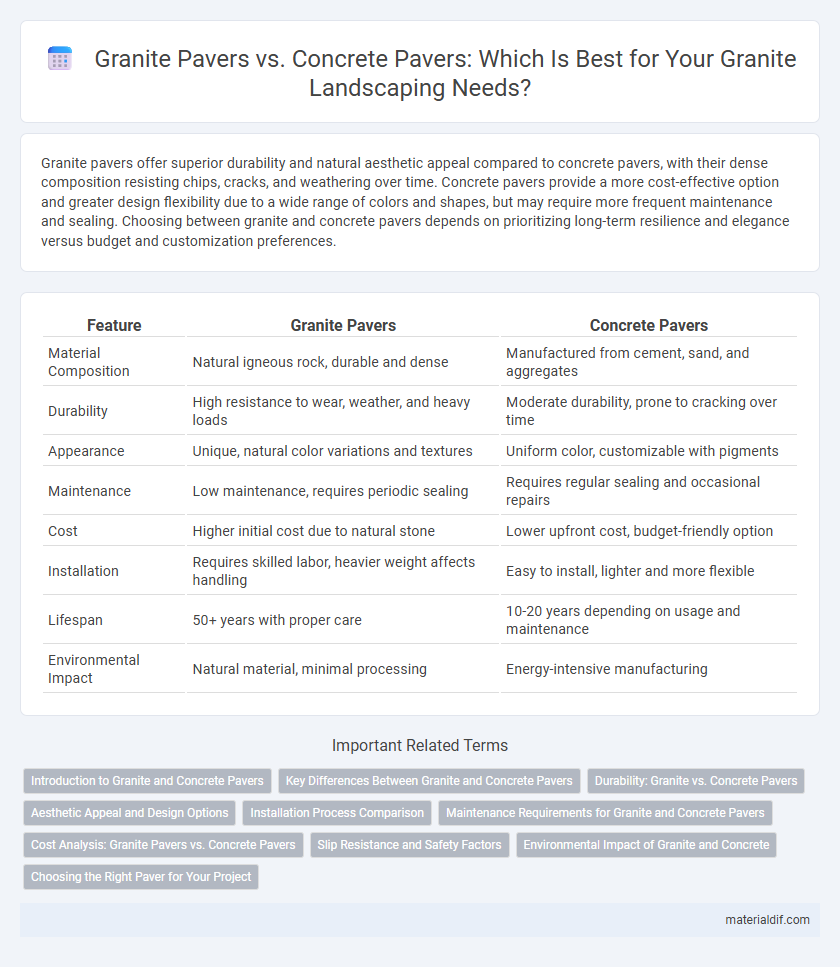Granite pavers offer superior durability and natural aesthetic appeal compared to concrete pavers, with their dense composition resisting chips, cracks, and weathering over time. Concrete pavers provide a more cost-effective option and greater design flexibility due to a wide range of colors and shapes, but may require more frequent maintenance and sealing. Choosing between granite and concrete pavers depends on prioritizing long-term resilience and elegance versus budget and customization preferences.
Table of Comparison
| Feature | Granite Pavers | Concrete Pavers |
|---|---|---|
| Material Composition | Natural igneous rock, durable and dense | Manufactured from cement, sand, and aggregates |
| Durability | High resistance to wear, weather, and heavy loads | Moderate durability, prone to cracking over time |
| Appearance | Unique, natural color variations and textures | Uniform color, customizable with pigments |
| Maintenance | Low maintenance, requires periodic sealing | Requires regular sealing and occasional repairs |
| Cost | Higher initial cost due to natural stone | Lower upfront cost, budget-friendly option |
| Installation | Requires skilled labor, heavier weight affects handling | Easy to install, lighter and more flexible |
| Lifespan | 50+ years with proper care | 10-20 years depending on usage and maintenance |
| Environmental Impact | Natural material, minimal processing | Energy-intensive manufacturing |
Introduction to Granite and Concrete Pavers
Granite pavers are natural stone products known for their exceptional durability, resistance to wear, and unique, elegant appearance, making them ideal for both residential and commercial outdoor spaces. Concrete pavers consist of molded cement combined with aggregates and pigments, offering cost-effective versatility and a wide range of shapes and colors for customized design. Both materials provide strong, long-lasting solutions for patios, walkways, and driveways but differ significantly in composition, maintenance, and aesthetic appeal.
Key Differences Between Granite and Concrete Pavers
Granite pavers offer superior durability and natural aesthetics compared to concrete pavers, which are more affordable but prone to cracking and discoloration over time. Granite's density and hardness provide enhanced resistance to weathering, staining, and heavy traffic, making it ideal for high-traffic areas. Concrete pavers, however, allow for greater design flexibility and are easier to install and replace, but they lack the long-term resilience and unique texture of granite.
Durability: Granite vs. Concrete Pavers
Granite pavers offer superior durability compared to concrete pavers due to their natural stone composition, which resists cracking, chipping, and heavy wear over time. Concrete pavers, while cost-effective, are more prone to surface erosion and damage from freeze-thaw cycles, reducing their lifespan. The dense, hard structure of granite ensures long-lasting performance in high-traffic areas and extreme weather conditions.
Aesthetic Appeal and Design Options
Granite pavers offer a natural, timeless aesthetic with unique veining and colors that enhance landscaping elegance, whereas concrete pavers provide versatility through customizable shapes, colors, and textures. The durability and dense composition of granite ensure long-lasting beauty and resistance to fading, making it ideal for high-traffic areas. Concrete pavers, while more affordable, boast diverse design possibilities including stamped or stained finishes that mimic natural stone or brick patterns.
Installation Process Comparison
Granite pavers require precise cutting and professional installation to ensure a durable and visually appealing finish, often involving specialized tools for shaping and fitting. Concrete pavers offer easier and faster installation with uniform shapes and sizes, allowing for DIY approaches and less labor-intensive work. The complexity of granite installation typically results in higher labor costs compared to the more straightforward placement of concrete pavers.
Maintenance Requirements for Granite and Concrete Pavers
Granite pavers require minimal maintenance due to their natural durability and resistance to stains, scratches, and weathering, often needing only occasional sealing to maintain their appearance. Concrete pavers, while more affordable, demand regular sealing and cleaning to prevent discoloration, erosion, and weed growth in the joints. The long-term maintenance cost for granite pavers tends to be lower compared to concrete, owing to granite's superior strength and resistance to environmental wear.
Cost Analysis: Granite Pavers vs. Concrete Pavers
Granite pavers typically cost between $15 to $30 per square foot, reflecting their durable natural stone composition and aesthetic appeal, while concrete pavers range from $5 to $15 per square foot due to cost-effective manufacturing. Installation expenses for granite pavers are generally higher because of the stone's weight and required labor precision, whereas concrete pavers offer lower installation fees and faster project turnaround. Long-term maintenance costs favor granite pavers, as they resist cracking and weathering better than concrete, which may need periodic sealing, repairs, or replacement over time.
Slip Resistance and Safety Factors
Granite pavers offer superior slip resistance due to their natural textured surface and high durability, making them a safer choice for walkways and patios in wet or icy conditions. Concrete pavers, while cost-effective, often require additional anti-slip treatments or sealants to enhance safety and reduce the risk of slipping. Choosing granite pavers ensures long-term safety benefits with minimal maintenance, particularly in high-traffic or moisture-prone areas.
Environmental Impact of Granite and Concrete
Granite pavers offer a lower environmental impact compared to concrete pavers due to their natural composition, durability, and minimal processing requirements, which reduce energy consumption and carbon emissions during production. Concrete pavers involve significant CO2 emissions from cement manufacturing and require more frequent replacement, increasing long-term environmental costs. The extraction and fabrication of granite, when managed sustainably, result in less pollution and waste, making granite a more eco-friendly option for paving projects.
Choosing the Right Paver for Your Project
Granite pavers offer superior durability and natural aesthetics compared to concrete pavers, making them ideal for high-traffic areas and long-lasting outdoor projects. Concrete pavers provide cost-effective versatility with a wide range of colors and shapes, suitable for budget-conscious landscaping designs. Selecting the right paver depends on project requirements such as budget, desired appearance, and the paver's ability to withstand environmental conditions.
Granite Pavers vs Concrete Pavers Infographic

 materialdif.com
materialdif.com